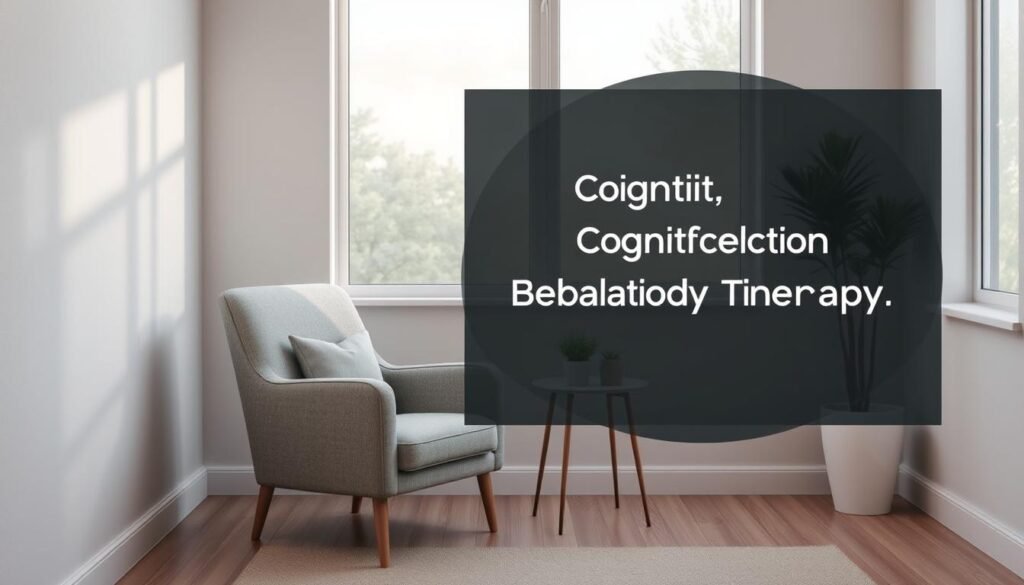About 20% of U.S. adults who have been diagnosed with depression use prescription meds. These include SSRIs like Prozac and Zoloft. However, many are looking for non-medication treatments for depression. They try things like St. John’s wort for mild to moderate depression. They also explore yoga and music therapy. These natural remedies for depression offer hope with fewer side effects than drugs.
This piece will look at drug-free options that science backs up. It wants to help those dealing with depression find ways to get better mentally. They can build strength without relying only on medicine.
Key Takeaways
- St. John’s wort can effectively alleviate symptoms of mild to moderate depression.
- Non-medication treatments for depression include exercise, yoga, and nutritional counseling.
- Music therapy is an effective way to manage feelings of anxiety and stress related to depression.
- Regular physical activity has proven benefits for mood and overall quality of life.
- Cognitive Behavioral Therapy (CBT) and mindfulness practices play a vital role in treating depression.
- Probiotic-rich foods and omega-3 supplements can enhance mental well-being.
Understanding Depression: Symptoms and Causes
Understanding the roots of depression is vital. It helps us see its impact on lives. Depression shows up in different ways. People may feel sad, lose interest in things, sleep badly, and feel worthless. These signs must be present for at least two weeks for a Major Depressive Disorder diagnosis.
Identifying Major Depressive Episodes
Major Depressive Episodes mean having five or more symptoms. They greatly affect everyday life. Depression’s causes are often a mix of biological, psychological, and environment factors. Understanding symptoms helps in seeking timely help.
Common Misconceptions About Depression
There are many myths about depression. Some think it shows weakness or can be overcome by willpower alone. Such views stop people from seeking necessary treatment. Education and support are key. They help spot signs and fight these myths. Understanding this helps us see depression can hit anyone, at any age.
| Type of Disorder | Duration | Common Symptoms |
|---|---|---|
| Major Depressive Disorder | At least 2 weeks | Persistent sadness, loss of interest |
| Persistent Depressive Disorder | At least 2 years | Chronic low mood, fatigue |
| Perinatal Depression | During or post-pregnancy | Anxiety, sadness, changes in appetite |
| Seasonal Affective Disorder | Seasonal pattern | Low energy, difficulty concentrating |
| Bipolar Disorder | Variable | Manic and depressive episodes |
Non-Medication Treatments for Depression
Treating depression isn’t just about medications. Many non-drug approaches can help too. These include lifestyle changes, psychological strategies, and natural remedies. They help you play an active part in your own recovery journey.
Overview of Non-Drug Approaches
There are many ways to address depression without medicine. They include:
- Exercise Therapy: Get at least 150 minutes of exercise like walking or lifting weights each week. This can really help lift depression.
- Mindfulness and Relaxation Techniques: Doing yoga, meditating, or deep breathing can lower stress and make you feel better.
- Nutritional Counseling: Eating well is key. Foods and vitamins, like St. John’s wort and ginkgo biloba, are important.
- Proper Sleep Hygiene: A cool, dark, and quiet bedroom promotes better sleep. Avoid screens before bedtime to sleep well.
- Alternative Healing Methods: Techniques like acupuncture help by releasing the body’s natural chemicals.
Research and Efficacy of Natural Treatments
Many studies show natural treatments for depression really work. They’re great for mild depression and can be as effective as antidepressants for moderate depression. Using a mix of treatments can be better than just one method.

| Treatment Method | Research Findings |
|---|---|
| Exercise | Helps reduce depression symptoms; improves mood and self-worth. |
| Mindfulness Practices | Reduces stress effectively; boosts spirits. |
| Supplements | Show promise, but more research is needed. |
| Sleep Hygiene | Helps lessen symptoms and protect against getting depression again. |
| Alternative Methods | Believed to encourage the body’s healing. |
Improving mental health is a personal journey. Using a mix of Non-Medication Treatments for Depression leads to better recovery. It builds resilience and well-being over time.
Cognitive Behavioral Therapy: A Powerful Tool
Cognitive Behavioral Therapy, or CBT, is a top method for addressing depression and other mental conditions. It helps identify and change harmful thoughts. By learning therapeutic techniques, CBT aids individuals in adopting healthier thinking habits.
What is Cognitive Behavioral Therapy?
CBT believes that our thoughts influence our feelings and actions. People in therapy work to tackle distortions in thinking. This effort leads to better functioning and life quality. The method treats a range of issues, from anxiety to eating disorders.
How CBT Can Help Alleviate Depression Symptoms
Studies show CBT’s success in battling depression. It significantly boosts mental well-being. Through role-playing and facing fears, clients gain useful coping skills. They learn self-help strategies for the future.
Furthermore, CBT proves as strong as, or better than, medication for depression. People treated with CBT are less likely to fall back into depression. This points to CBT’s role in a full treatment plan for mild to moderate depression.

Exercise Therapy: The Mood Booster
Exercise plays a key role in boosting mental health. It helps lessen depression symptoms. By exercising, we can improve how we feel both mentally and emotionally.
The U.S. Department of Health recommends at least 150 minutes of aerobic activity each week. This helps improve your mood significantly.
Benefits of Regular Exercise on Mental Health
Exercises, like walking or gardening, can make you feel better. They help with depression and anxiety. Even a short activity can impact your mood positively.
People who follow exercise programs feel much better. Studies have shown that walking on a treadmill for 30 minutes daily can reduce depression.
Types of Physical Activities Recommended
There are many different activities you can try:
- Aerobic Exercises: Things like running, cycling, or swimming boost your heart rate.
- Yoga: This mixes movement with meditation and breathing for a peaceful mind and body.
- Strength Training: This helps build muscle and makes you mentally stronger.
- Everyday Activities: Simple tasks like gardening or washing your car are also good for your mood.
Staying active is important for your mental wellness. Choose activities that suit you to help manage depression. If you’re exercising but still feel down, see a professional for help.
Always talk to a healthcare professional before starting new exercises. This ensures it’s safe for you.

Light Therapy: Finding Sunshine in Darkness
Light therapy is a big step forward in treating depression. It’s especially good for those with Seasonal Affective Disorder (SAD). This therapy uses bright lights that act like natural sunlight. It helps improve your mood and fixes your body clock. Knowing how light therapy works is key to understanding its benefits in fighting depression.
How Light Therapy Works
Light therapy helps by making you sit in front of a very bright light, about 10,000 lux. This light affects your serotonin levels and fixes your sleep-wake cycle. It’s crucial in winter when there’s not much sun. Many find quick relief using this therapy, often feeling better in just a few days.
Tips for Effective Light Therapy Use
To get the most out of light therapy, follow these tips:
- Timing: Do light therapy in the morning for the best effect.
- Duration: Spend at least 30 minutes with the light each day.
- Distance: Stay a good distance from the light to avoid hurting your eyes.
- Consistency: Use it every day, especially when SAD is at its worst.
- Consultation: Talk to a doctor to tailor it to your needs.
Since the 1980s, Bright Light Therapy (BLT) has been a top choice for treating SAD. It’s proven to work better than many standard medicines. Light therapy is safe, with few mild side effects, and doesn’t lead to addiction or big drug interactions. It’s a trusted option for those looking to manage depression safely.
Mindfulness-Based Interventions for Clarity and Calm
Mindfulness is now a key player in fighting depression. It helps people focus on the present without judging it. Through techniques like Mindfulness-Based Stress Reduction (MBSR) and Mindfulness-Based Cognitive Therapy (MBCT), many find relief from anxiety and depression. The past decade has seen a big jump in how much people are into these practices. This is thanks to lots of research showing how well they work.
The Role of Mindfulness in Overcoming Depression
Mindfulness is really important for controlling emotions and reducing stress. It’s been shown to be more effective than some traditional methods, such as health classes or relaxation. It even works as well as cognitive-behavioral therapy for some people.
Those who try mindfulness feel better and can deal with stress easier. They become more resilient to life’s ups and downs.
Effective Mindfulness Practices to Try
Adding mindfulness to your day can make a big difference in your mental health. Here are some good ways to start:
- Mindfulness meditation: This can make your mind clearer and reduce negative thoughts.
- Breathing exercises: Focusing on your breath can help you stay in the moment.
- Mindful movement: Doing yoga or tai chi blends moving and mindfulness, which is good for you.
- Body scans: Paying attention to how your body feels can relax you.
Mindfulness is also a big part of other therapies, like Dialectical Behavioral Therapy (DBT) and Acceptance and Commitment Therapy (ACT). Using these mindfulness techniques can lessen feelings of depression and stress. It can lead to a happier, more balanced life.
Nutritional Counseling: Fuel Your Mood
Nutrition has a big role in mental health and can change our mood. It helps those facing depression. Eating right helps control symptoms and improves mental health. The Diet and Mental Health research shows how food affects our feelings.
Foods that Improve Mental Well-Being
Eating fruits, vegetables, whole grains, and lean proteins is good for our mind. Studies say these foods can lower depression risk by 33%. But, too much processed food might increase depression risk by 41-58%. Foods rich in omega-3 fatty acids, like fish and flaxseeds, can make us feel better.
A balance of omega-6 and omega-3 fats is key. The typical Western diet has too much omega-6, which can make us sad.
Supplements and Nutrients for Depression
Using supplements for depression like Vitamin D, magnesium, and selenium helps with mood. Many Americans lack Vitamin D, affecting our body negatively. Over 60% EPA in omega-3 supplements could treat depression symptoms. Curcumin also helps, especially if sleep and eating habits change during tough times.
Learnings from nutritional psychology research show that diet plays a role in fighting depression. With therapy and exercise, it leads to better mental health.
Support Groups: The Power of Community
Support groups are vital for those dealing with depression and mental health issues. They allow members to share their stories and get support from others who truly understand. Such groups create a healing space. This makes the journey toward recovery more insightful and full of empathy, thanks to Community Support for Depression.
Benefits of Joining a Support Group
Being part of a support group has several mental health benefits. These include:
- Emotional support: It helps reduce the feeling of being alone.
- Coping strategies: You can learn new ways to tackle life’s challenges.
- Hope and motivation: Success stories inspire positivity and the will to keep going.
- Peer-led initiatives: Groups often run by those with direct experience give real, relatable advice. NAMI organizes such groups.
How to Find a Support Group Near You
Choosing the right group is crucial. Here’s how to find one:
- Look at community centers or health facilities. They often host meetings.
- Use the internet. It’s a great tool for finding both local and nationwide groups. Many are even online.
- Check out NAMI Connection and the NAMI Family Support Group. They are designed for individuals and their families dealing with mental health problems.
- For more help, call helplines to find support groups near you.
There’s a wide range of support groups out there, catering to different needs. Whether it’s in-person or online, these groups are crucial. They help build vital community bonds on the path to recovery.
Conclusion
In summary, fighting depression needs a mix of treatments. We can use both natural and traditional ways. It’s key to know that therapies like cognitive behavior therapy and working out help a lot. They can be as good as medicines for some people. This knowledge lets people try options that fit their lifestyle.
Not all natural methods have strong proof yet. But, things like eating right, staying mindful, and having a good support circle matter. They look at mental health in a complete way. This gives hope to those wanting to avoid medicine’s side effects.
Choosing the best treatment mix usually needs a doctor’s advice. Working with mental health experts helps customize the approach. As we learn more about depression, people should actively seek health, using both new and known ways to get better.